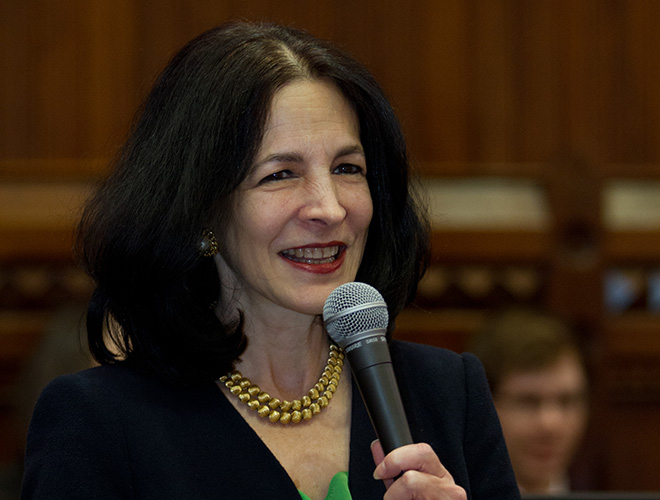
Many of you may have seen my email message earlier this month about HB 6851, which would create a Transit Corridor Development Authority for the purposes of transit-oriented development around rail and bus stations. I testified in strong opposition to the bill during its public hearing on March 6. The bill would strip towns and cities of their local decision-making authority over large tracts of property by transferring it to a board of state-level appointees. It would also permanently expose anyone who owns property anywhere within half a mile of a rail or bus station to the threat of eminent domain. HB 6851 would have significant ramifications for most municipalities in Connecticut were it to pass as written. If you are not aware of the bill, you may find it useful to read this op-ed piece that I released last week and that has appeared in several publications in Fairfield County.
Eminent Domain on Steroids?
A New Bill Threatens Cities and Towns
How would you feel if a group of people who lived elsewhere in the state and whom no one had elected were to take over certain planning and zoning functions in your town or city and unilaterally make critical decisions about entire neighborhoods -- like who could own property there, and what they could do with it? Although this scenario seems far-fetched, it is clearly outlined in governor’s bill HB 6851, which has just received a public hearing in the General Assembly.
HB 6851 would strip towns and cities of part of their local planning and zoning decision-making authority by transferring it to a board of state-level appointees. It would also permanently expose all those who own property anywhere within half a mile of a rail or bus station to the threat of eminent domain.
On the surface, the purpose of HB 6851 is laudable: to promote transit-oriented development. TOD both encourages the use of public transit and makes it easily accessible to people who cannot or choose not to drive. TOD’s potential beneficiaries include, among others, young professionals, seniors, people with disabilities, and people with limited incomes. Those living outside TOD areas benefit too, from reduced vehicle emissions, less traffic, a multi-generational populace, and concentration of development away from greenspaces.
TOD is a concept that many communities would like to pursue. But under HB 6851 they might not have the chance, because instead, it would be pursued for them by a group of political appointees, without any requirement for local approvals at all.
Here’s the substance of the bill:
- It creates a quasi-public entity called the Connecticut Transit Corridor Development Authority (TCDA) that would be run by a board of 11 voting members, including seven political appointees and four state agency commissioners.
- It allows the TCDA to promote TOD in TCDA districts, which include all properties within a half-mile radius of a rail or bus station.
- It gives the TCDA board eminent domain powers within TCDA districts.
- It requires the TCDA board to consult with the chief elected official of a municipality where development is taking place, but does not require the board to obtain his or her approval for anything. Nor does it require the TCDA board to consult with or obtain approvals from any local legislative bodies, boards, or commissions.
- It gives the TCDA the authority to issue its own bonds, financed by revenues collected through fees and rents, as well as state taxes.
- In short, the bill would give 11 non-elected people the authority to do whatever they wanted in 500-acre swaths of any city or town in Connecticut with a rail or bus station, and no one in those municipalities would be able to do anything about it.
The political composition of the board also raises questions about contractor and developer selection and agreements, whatever the political party or parties making TCDA board appointments.
Were the legislative intent simply to offer TOD assistance and incentives to municipalities and to give their citizens or elected officials a vote in local decisions, HB 6851 could easily have been drafted differently. But it wasn’t. Instead, the language of the bill explicitly allows a non-elected body to supersede completely the authority of representative local government with no checks and balances whatsoever.
HB 6851 now awaits consideration by the legislature’s Planning and Development Committee. The administration’s proposal of the bill raises many disturbing questions about its policy stance on the state’s role in local government. The implications are vast for residents of every city and town in Connecticut.